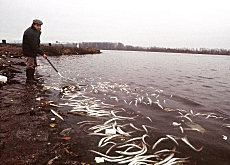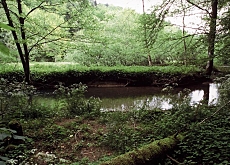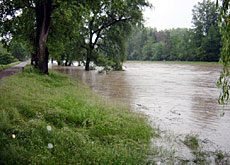River Rhine washes away traces of disaster

Wednesday marks the 20th anniversary of the Schweizerhalle disaster, which saw toxic chemicals leak into the Rhine at Basel, polluting the water and killing wildlife.
Officials say that great progress has been made in cleaning up the river since then, thanks to cross-border cooperation and heightened political awareness of environmental issues.
“The quality of the Rhine’s waters is today relatively good,” Anne Schulte-Wülwer-Leidig, deputy head of the International Commission for the Protection of the Rhine (ICPR), told swissinfo. “Even salmon are coming back to live in the Rhine.”
This is mainly because of the prompt measures that were taken to clean up and protect the river after the accident, she said.
On November 1, 1986 a fire broke out at the Sandoz factory in the Schweizerhalle industrial zone in Basel. As firefighters battled the blaze, around 20 tons of insecticides, fungicides and herbicides leaked out into the Rhine.
“The effects on flora and fauna were devastating,” said Schulte-Wülwer-Leidig.
The river ran red, thousands of dead fish floated on the surface, and the eel was totally wiped out. The effects were felt along the Rhine as far away as the Netherlands.
Local residents were however largely untouched, other than by the foul-smelling cloud of chemicals that resulted from the fire.
But pictures of the disaster were broadcast around the world and the reputation of the Swiss chemical industry took a battering.
Action
The catastrophe shocked a nation and people demonstrated on river bridges, calling for swift action by politicians.
Schulte-Wülwer-Leidig says their calls were heeded in the form of the Rhine Action Programme. This project, co-funded by the countries that sit along the river, was aimed at stopping a repeat of the Schweizerhalle accident and saving the river from pollution in general.
Around €60 billion (SFr95 billion) has been invested in new water purification plants as part of the multinational project.
The amount of pollutants in the Rhine has since been reduced by 50 per cent and its water has once again been declared suitable for use as drinking water.
But not all problems have been solved. The Rhine has long suffered from pollution – it was known before the disaster as the “sewer of Europe”.
Pollutants
Even today heavy metals such as zinc, copper and cadmium, as well as pesticides and nitrates, are still making their way into the water.
Local government experts and Basel University researchers have also found that river water temperature has on average risen by three degrees due to the effects of refrigeration systems, higher air temperature and household wastewater.
Officials have also pointed to water contamination through chemicals containing hormones, such as the contraceptive pill, which have been found to make fish infertile.
Until the fire at the Sandoz factory 20 years ago no one in Switzerland thought that such a disaster was possible. Nowadays companies and experts are far more aware of the risks.
But Schulte-Wülwer-Leidig says a repeat of the Schweizerhalle pollution cannot totally be ruled out.
“We try of course as much as possible to eliminate the risks,” she told swissinfo. “But you can never totally rule out accidents. Risks always remain.”
swissinfo, Susanne Schanda
The Basel chemicals company Sandoz, which in 1996 merged with Ciba-Geigy to form Novartis, paid out damages of around SFr43 million in Switzerland, France, Germany and the Netherlands.
In 1987 the company paid out SFr10 million to form a fund for the Rhine to finance research on the river’s ecosystem.
Environmental law was also amended to plug the gaps in legislation for dealing with such disasters.

In compliance with the JTI standards
More: SWI swissinfo.ch certified by the Journalism Trust Initiative











You can find an overview of ongoing debates with our journalists here . Please join us!
If you want to start a conversation about a topic raised in this article or want to report factual errors, email us at english@swissinfo.ch.